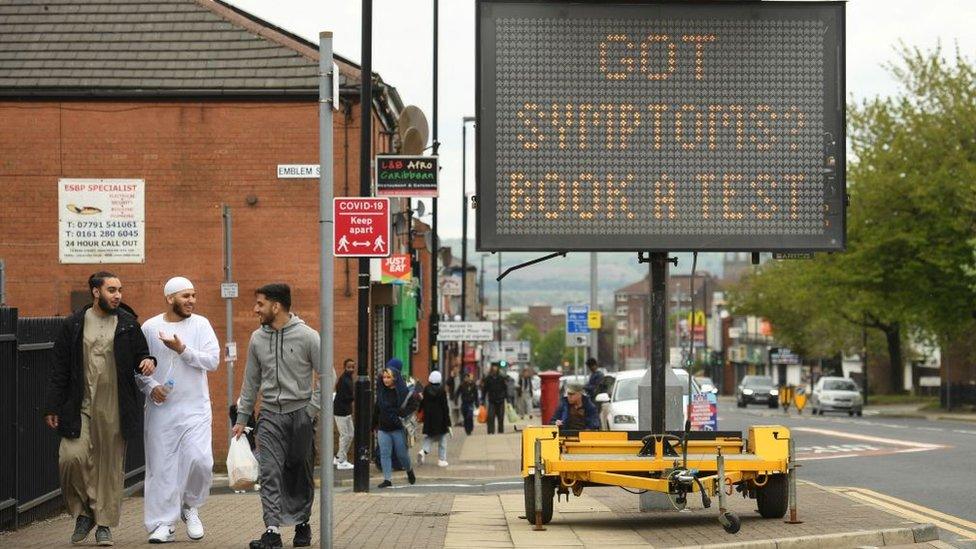Covid: Indian variant could disrupt 21 June easing, PM says
- Published
Boris Johnson: New variant "may cause disruption to our attempts to continue down the roadmap"
The Indian virus variant could pose "serious disruption" to lockdown easing in England on 21 June, the PM says.
Boris Johnson said if it was found to be "significantly" more transmissible there could be "some hard choices".
The wait between jabs will be cut from 12 weeks to eight for the over-50s and clinically vulnerable because of concern over the variant, he added.
Cases of the Indian coronavirus variant have nearly tripled in the past week, Public Health England figures show.
Surge testing is already taking place in 15 areas across England, including Bolton, Blackburn, London, Sefton and Nottingham.
According to Friday's government figures, a further 17 people have died in the UK within 28 days of a positive test and another 2,193 coronavirus cases have been recorded.
Speaking at a Downing Street briefing alongside the UK's chief medical adviser, Prof Chris Whitty, Mr Johnson said first Covid vaccine doses will also be prioritised "for anyone eligible who has not yet come forward". Currently, England's vaccination rollout is open to people over the age of 38.
The prime minister said he did not believe that the "present evidence" showed a need to delay the next stage in the easing of lockdown in England on Monday - when pubs and restaurants will be allowed to serve customers indoors and six people or two households can meet in a private home.
But Mr Johnson warned: "I have to level with you that this new variant could pose a serious disruption to our progress and could make it more difficult to move to step four in June."
He added: "But I urge everyone to exercise the greatest caution because the choices we each make in the coming days will have a material effect on the road ahead."
He said he did not believe it was "impossible" to go ahead with step four of England's roadmap to ease coronavirus restrictions, but "we have to be utterly realistic" and there was "the risk of disruption and delay".
The government's aim with the fourth and final step of the roadmap is to remove all legal limits on social contact on 21 June - meaning there will be no limits on gatherings indoors or outdoors - nightclubs will be allowed to reopen and there will be no limits on weddings.
The government has said easing restrictions on 21 June depended on its four tests being met - including that vaccines continue to be effective and the risks are not fundamentally changed by new variants.


After months of positive news, including falling cases and a hugely successful vaccination campaign, the tone has shifted.
The full relaxation in June is in jeopardy and there is the looming spectre of greater pressure on the NHS.
It is important to remember we are in a dramatically different situation than at the start of the year, due to the huge success of the vaccination campaign.
But we are in a race between the virus and the vaccine. Easing restrictions on Monday and a more transmissible variant means the virus will move even faster.
The faster the virus spreads, the more people will get infected and the more people could end up in hospital. This is because vaccines are great, but not perfect and not every vulnerable person has had one.
Sage estimates a variant that is 40% more transmissible could put pressure on hospitals and that it is possible the variant that emerged in India spreads even more quickly than that.
The problem, though, is even greater for countries which haven't got successful vaccination programmes, where even more transmissible variants could be hugely damaging.

Mr Johnson added that there was "no evidence to suggest that our vaccines will be less effective in protecting people against severe illness and hospitalisation".
The Army will be deployed on the streets of Blackburn and Bolton to give out tests to help the surge testing efforts.
There will be an acceleration of the vaccine rollout there, Mr Johnson said, including longer opening hours at vaccination centres.
Prof Whitty said delays to the vaccination programme for younger people were not expected with the prioritisation of second doses for older age groups.
Why do new variants of Covid-19 keep appearing? BBC's health reporter Laura Foster explains
He warned that if the variant first discovered in India proved to be more transmissible than other variants, the UK could see "a really significant surge" in Covid-19 cases, adding: "That's a really critical question to which we do not yet have the answer."
"We expect over time this variant will overtake and come to dominate in the UK in the way that the Kent variant did," he added.
The Scientific Advisory Group for Emergencies (Sage) has said there is a "realistic possibility" that the variant could be as much as "50% more transmissible" than the Kent strain.
Cases of the Indian variant found in the UK to date have nearly tripled in the past week to 1,313, Public Health England said. , external
Most of the cases - 1,255 - are in England, while there are 35 in Scotland, 12 in Northern Ireland and 11 in Wales, according to PHE.
It said four people have now died with the Indian variant - officially designated a variant of concern - as of 12 May.

Surge testing is taking place in 15 areas across England, including in Bolton
Mobile testing units have been set up in Bolton, PHE said, and door-to-door PCR testing had been offered to 22,000 residents. A PCR test is the most accurate way to check for Covid.
More doses have been delivered to the town, which has also set up a vaccine bus to increase uptake among those who are eligible. A rapid response team of 100 nurses, public health advisers and environmental health officers has also been sent in.
Mr Johnson warned those living in Bolton and other affected areas that there was "now a greater risk from this new variant" and he urged people to be "extra cautious".
"There will be targeted new activity in Bolton and Blackburn to accelerate vaccine take-up among eligible cohorts - including longer opening hours at vaccination sites," he said.
Extra clinics will open in Blackburn and Darwen in Lancashire from next week to offer the vaccine to those who are eligible under national guidelines. The vaccination capacity of local pharmacies will also be increased.
But the area's public health director, Prof Dominic Harrison, said he was "furious" the government had refused a request to extend vaccinations in Blackburn.
On Thursday, the council initially said all over-18s would be offered a jab, before later stating only those with underlying conditions could book an appointment.
When asked by Fergus Walsh, the BBC's medical editor, whether over-18s who live in hotspot areas should have a first vaccine dose, Prof Whitty said there had been "debate" on this point.
He said the UK's vaccine advisers believed the "sensible thing to do" was to prioritise jabs to "those most at risk in all the places across the UK", explaining that age remained the single biggest factor when it came to those who fell seriously ill or died from Covid.
Meanwhile, the R number - or reproduction number - in England is estimated to have risen slightly from between 0.8 and 1.0 to between 0.8 and 1.1, according to the government's Scientific Advisory Group for Emergencies.
If the R number is above one then the number of cases keeps increasing.
Elsewhere, the Welsh government has said it is "confident" its vaccination programme "already has the flexibility it needs to respond swiftly and effectively and are not making any changes at this stage".

LOOK-UP TOOL: How many cases in your area?
YOUR QUESTIONS: We answer your queries
TREATMENTS: What progress are we making to help people?
EPIDEMIC v PANDEMIC: What's the difference?


FREEDOM, FRIENDSHIP, SEX AND LOVE: The Pursuit of Love is streaming now on BBC iPlayer
POWERFUL NEW DRAMA DANNY BOY: Searching for truth in the fog of war

Related topics
- Published1 July 2022

- Published7 May 2021